Humza Yousaf quits as Scotland’s first minister
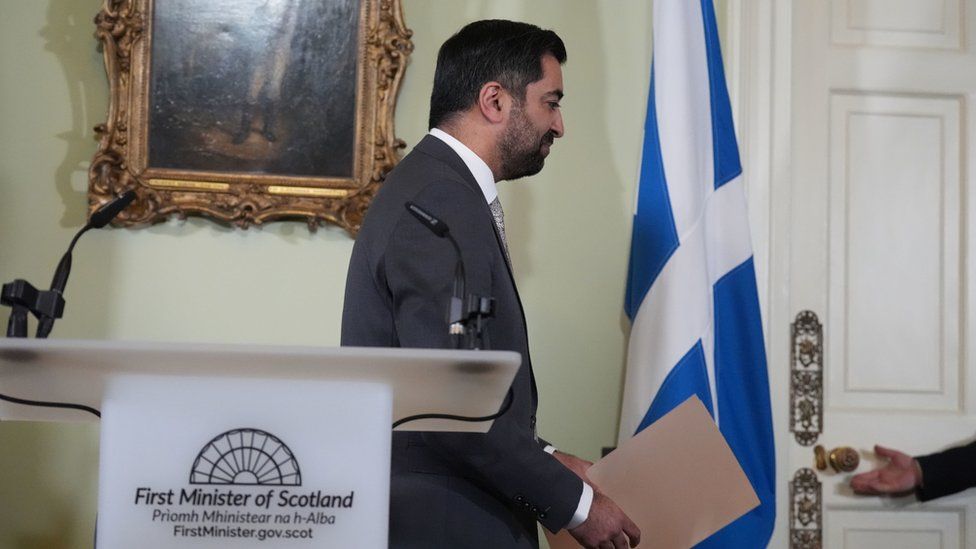
The search has begun for a new first minister of Scotland following Humza Yousaf’s announcement of his intention to quit the role.
He made the decision after spending the weekend reflecting on what was best for the SNP, the government and Scotland.
Mr Yousaf concluded that someone else would need to take over in order to “repair our relationship across the political divide”.
John Swinney and Kate Forbes are two SNP MSPs being talked of for the role.
Mr Swinney is a political veteran of his party and was its leader at the turn of the century. He resigned the post in the summer of 2004 and was succeeded by Alex Salmond.
Ms Forbes was a former SNP leadership candidate, losing to Mr Yousaf in the ballot which was held just over a year ago.
- Look back on the day that saw Humza Yousaf resigns
- Yousaf’s decision follows SNP political timebombs
- Who is Humza Yousaf? The rise and fall of Scotland’s first minister
The decision by Scotland’s first minister to go followed the collapse of the SNP’s power-sharing deal with the Greens.
Mr Yousaf’s decision to abruptly end the agreement just 48 hours after saying he had no intention of doing so angered the Greens and left him struggling to secure enough support in order to lead a a minority government.
He had been facing two votes of no confidence later this week that he was not certain to win, with the Greens saying they would vote to remove him as first minister.
Mr Yousaf insisted on Friday of last week that he would win the confidence votes and “absolutely” lead the SNP into the general election and the 2026 Holyrood election.
First Muslim to lead a major UK party
Speaking at his official Bute House residence in Edinburgh as he announced his resignation on Monday, he admitted that he had “clearly underestimated” the hurt he had caused the Greens by ending the agreement in the manner that he did.
He said: “After spending the weekend reflecting on what is best for my party, for the government and for the country I lead, I’ve concluded that repairing our relationship across the political divide can only be done with someone else at the helm.
“I have therefore informed the SNP’s national secretary of my intention to stand down as party leader.”
His resignation comes just 13 months after Mr Yousaf won the contest to succeed Nicola Sturgeon as first minister and SNP leader after narrowly defeating Kate Forbes in what had been a fractious leadership race.
He became the first ethnic minority leader of a devolved government in the UK and the first Muslim to lead a major UK party.
This video can not be played
To play this video you need to enable JavaScript in your browser.
Within days of Mr Yousaf’s appointment, Ms Sturgeon’s home was searched by police and her husband Peter Murrell – the SNP’s chief executive at the time – arrested as part of an ongoing investigation into the SNP’s funding and finances.
Ms Sturgeon was also later arrested but has not been charged with any offences. Mr Murrell has been charged with embezzlement.
It is not clear who is likely to replace Mr Yousaf – but they will be the seventh person to hold the post of first minister since the Scottish Parliament was established in 1999.
- Who might replace Humza Yousaf as first minister?
- What happens now after Humza Yousaf’s resignation?
Former SNP leader John Swinney, who served as deputy first minister to Ms Sturgeon, has already said he is actively considering standing and has received the backing of a number of influential figures within the party.
The SNP’s Westminster leader Stephen Flynn has ruled himself out and is among those backing Mr Swinney for the job, but Ms Forbes has been tipped to stand again.
She remains a divisive figure within the party over her views on social issues including trans rights and gay marriage, and is likely to be unpalatable to the Greens, but her supporters have said they expect her to put her name forward.
The BBC is not responsible for the content of external sites.
Allow Twitter content?
This article contains content provided by Twitter. We ask for your permission before anything is loaded, as they may be using cookies and other technologies. You may want to read Twitter’s cookie policy and privacy policy before accepting. To view this content choose ‘accept and continue’.
The BBC is not responsible for the content of external sites.
Mr Yousaf became visibly emotional as he paid tribute to his wife and children in his resignation speech.
He added: “I cannot tell you what an honour it is being the first minister of the country I love, the country I am raising my family in and the only country I will ever call home.”
He added: “As a young boy born and raised in Scotland, I could never have dreamt that one day I would have the privilege of leading my country.
“People that looked like me were not in positions of political influence let alone leading governments when I was younger.
“We now live in a UK that has a British Hindu PM, a Muslim mayor of London, a black Welsh first minister and, for a little while longer, a Scots Asian first minister of Scotland.”
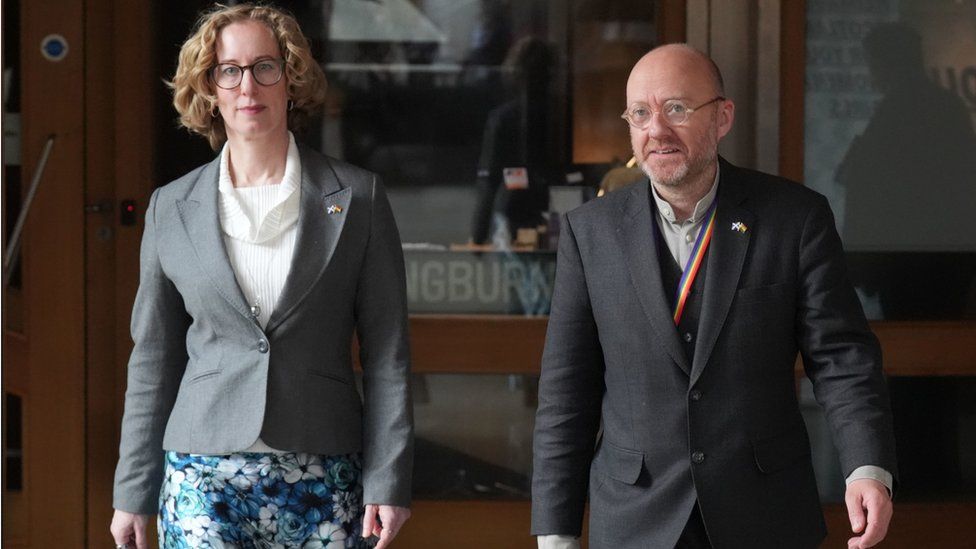
Opposition parties in the Scottish Parliament had tabled two confidence votes – one in the first minister and another in the SNP government as as whole.
Mr Yousaf had written to the other party leaders asking them to find “common ground” ahead of the votes, but was facing a battle for survival with his government no longer having a majority of seats in parliament.
Winning the vote could have meant reaching an agreement with Ash Regan – a former SNP MSP who defected to Alex Salmond’s Alba Party after finishing third in the SNP leadership contest.
This video can not be played
To play this video you need to enable JavaScript in your browser.
Mr Yousaf had reportedly ruled out having the SNP cut a deal with Alba, despite both parties supporting independence, ahead of his decision to quit.
As he announced his resignation, he said he was “not willing to trade in my values or principles or do deals with whomever simply for retaining power.”
Scottish Greens co-leader Patrick Harvie said Mr Yousaf was right to stand down, and accused him of breaking the “bonds of trust” with the Greens and “with everyone who wanted a stable, progressive, pro-independence government”.
Mr Harvie added: “It is regrettable that it has ended this way, it didn’t need to. We draw no satisfaction or pleasure from this.”
BBC Scotland understands that the Greens will now not support either of the no-confidence motions – meaning they are both likely to be voted down.
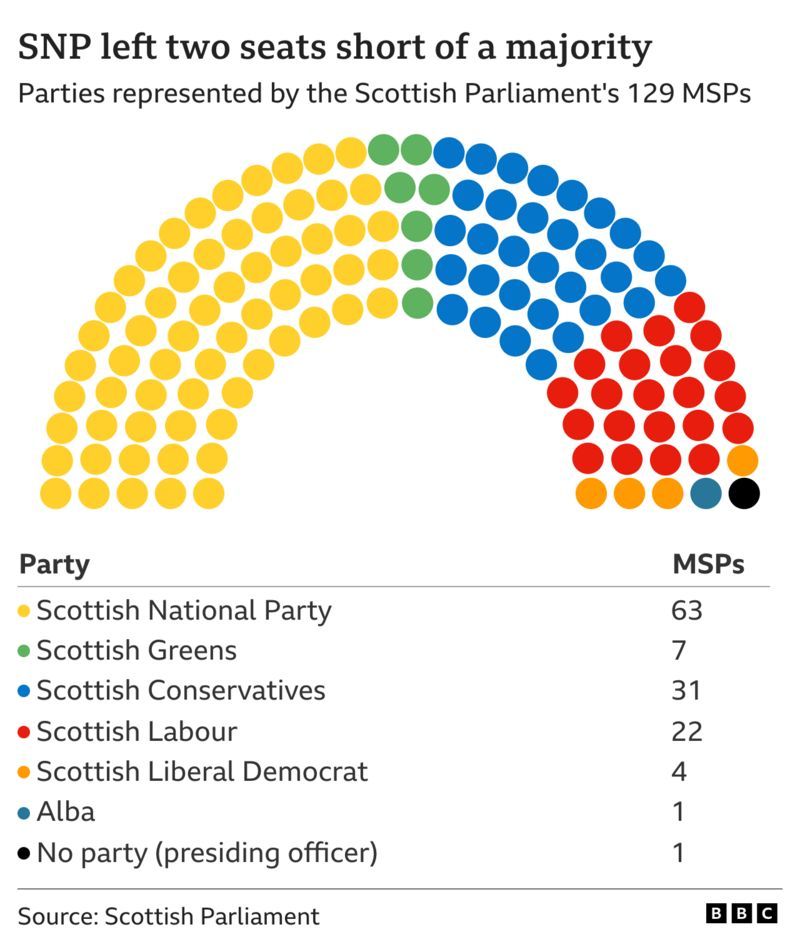
Scottish Conservative leader Douglas Ross said Mr Yousaf had failed as first minister “just like he failed as transport secretary, justice secretary and health secretary”.
“He has let the people of Scotland down, making Scotland the highest-taxed part of the United Kingdom”, Mr Ross said.
Scottish Labour has previously said its motion of no confidence in the Scottish government would remain tabled even if Mr Yousaf resigned.
Its leader, Anas Sarwar, said Scotland was facing the biggest challenges since devolution but but was being government by a “dysfunctional, chaotic and divided” SNP government.
He added: “They cannot impose another unelected first minister on Scotland in a backroom deal – the people of Scotland should decide who leads our country. There must be an election – it’s time for change.”
Related Topics
- Scottish government
- Scotland
- SNP (Scottish National Party)
- Humza Yousaf
-
Humza Yousaf resigns as Scotland’s first minister
-
14 hours ago
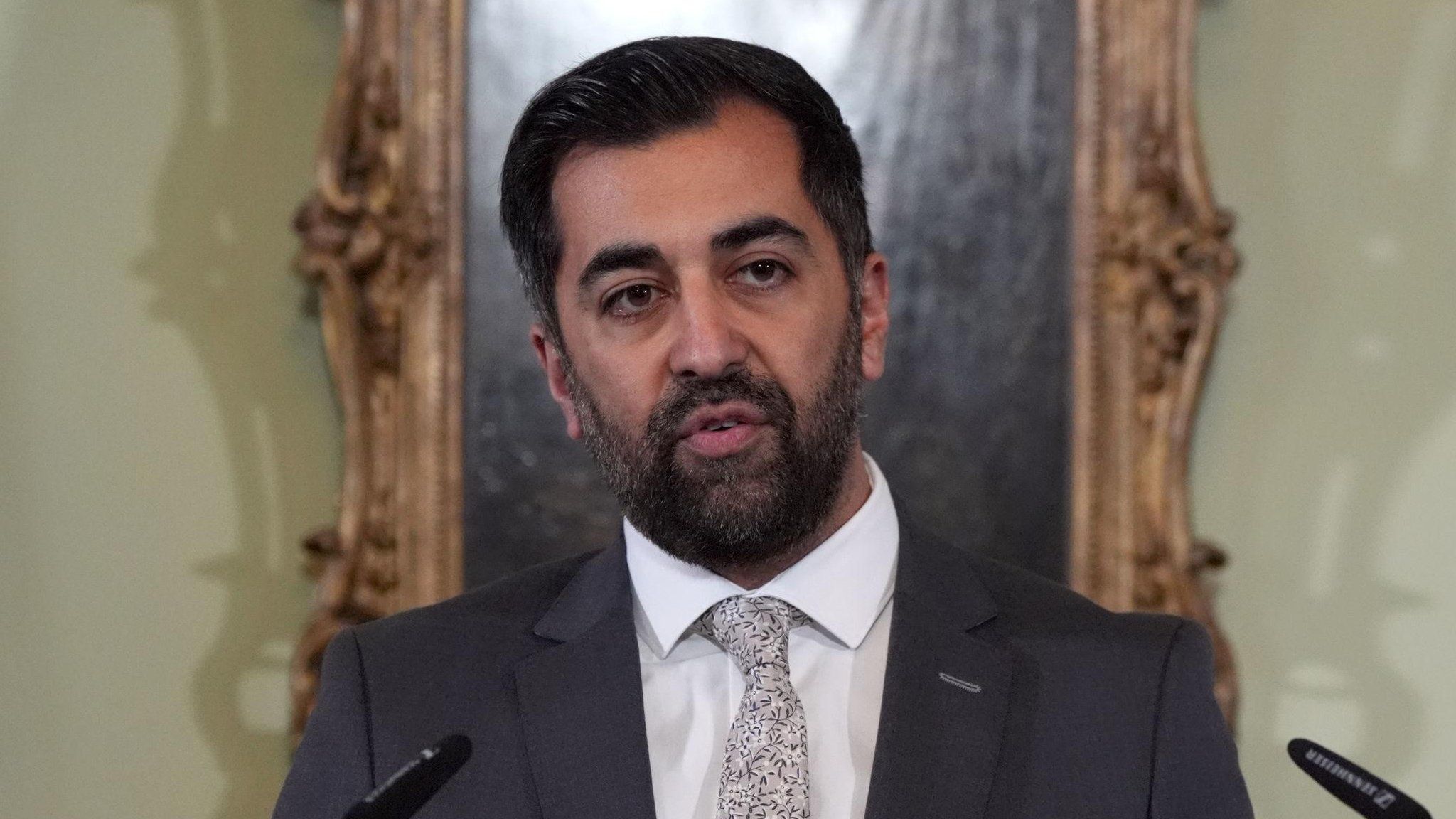
-
-
What happens now after Humza Yousaf’s resignation?
-
2 hours ago
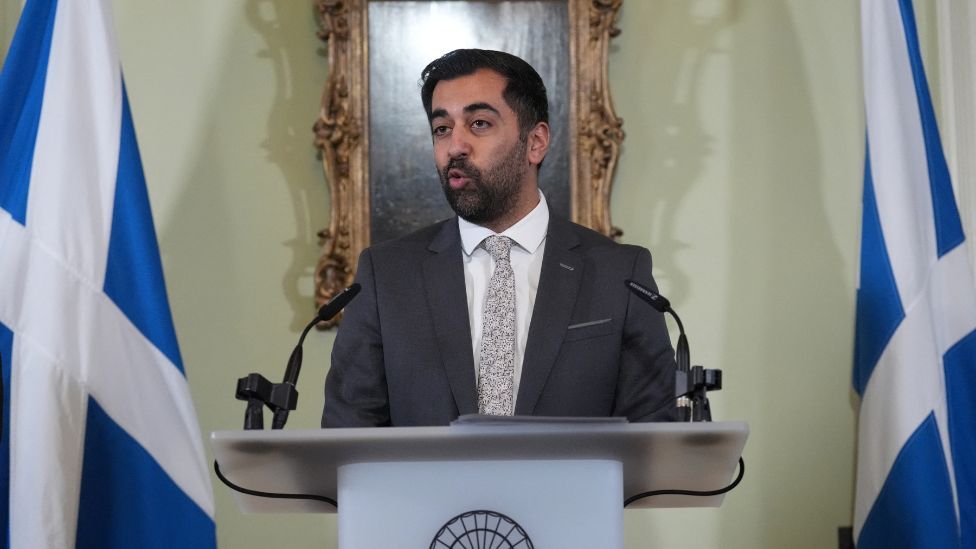
-
-
Yousaf’s decision follows SNP political time bombs
-
8 hours ago
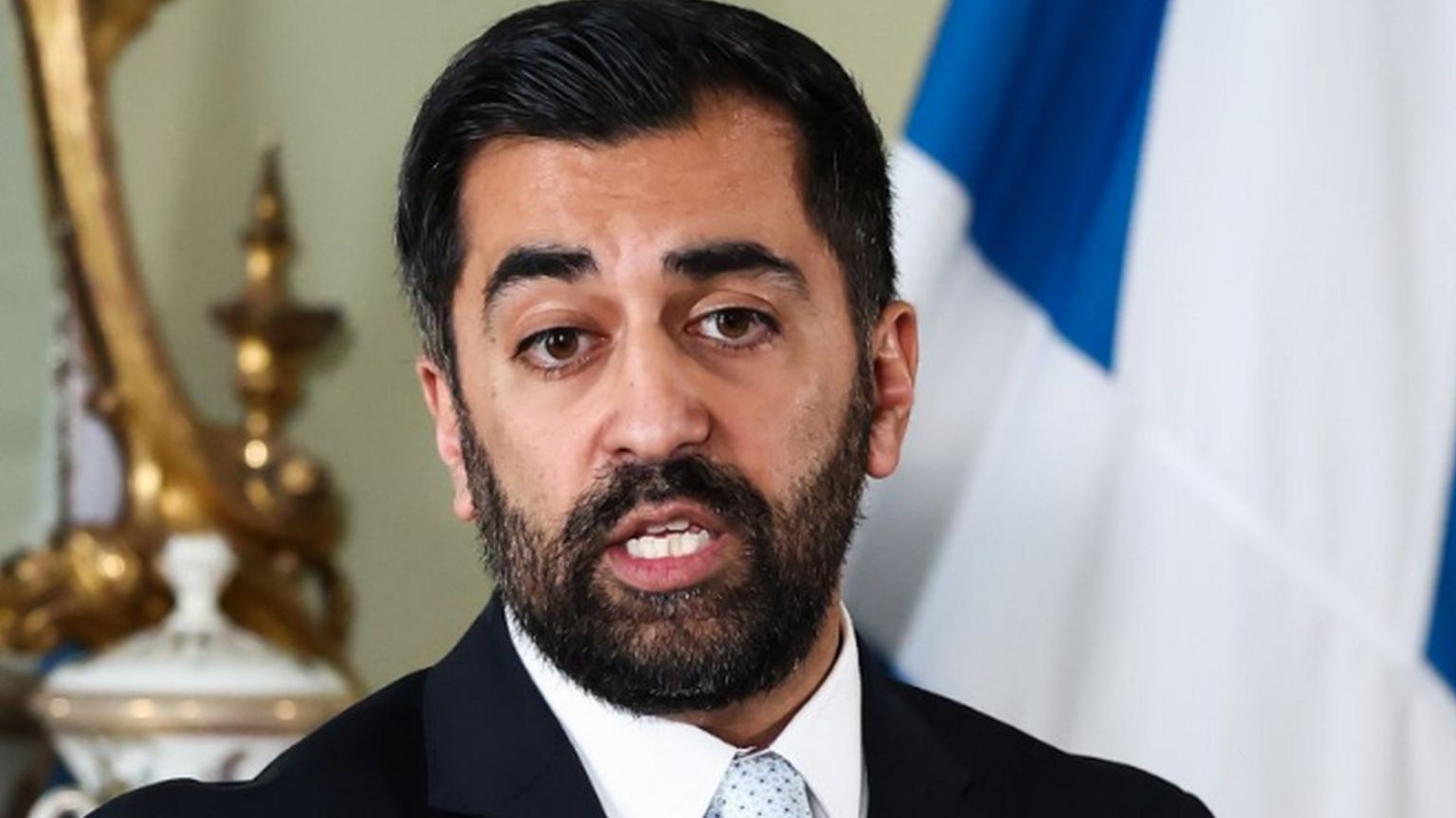
-
-
Yousaf: a challenging first year as first minister
-
29 March
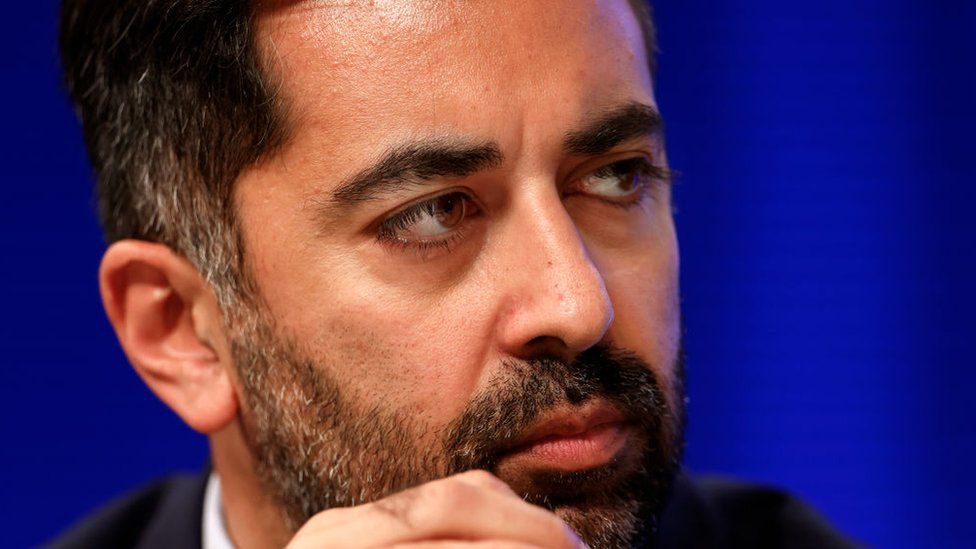
-
Published at Mon, 29 Apr 2024 18:30:30 +0000
